

Untitled. Bystander Effect. The Science of Empathy. What Is the Bystander Effect? If you witnessed an emergency happening right before your eyes, you would certainly take some sort of action to help the person in trouble, right?
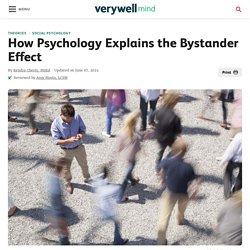
While we might all like to believe that this is true, psychologists suggest that whether or not you intervene might depend upon the number of other witnesses present. The Bystander Effect:The Death of Kitty Genovese. Factors that explain bystander effect. Beyond self-serving bias: diffusion of responsibility reduces sense of agency and outcome monitoring. We use cookies to enhance your experience on our website.By continuing to use our website, you are agreeing to our use of cookies.
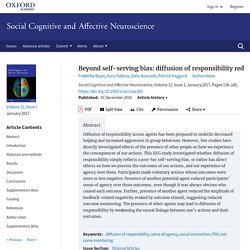
You can change your cookie settings at any time. <a href=" Find out more</a> Skip to Main Content Search Close Advanced Search Search Menu Article Navigation Volume 12 Issue 1 January 2017 Article Contents Beyond self-serving bias: diffusion of responsibility reduces sense of agency and outcome monitoring Frederike Beyer, How Diffusion of Responsibility Affects Group Behavior.
Diffusion of responsibility is a psychological phenomenon in which people are less likely to take action when in the presence of a large group of people.1 For example, imagine that you are in a large city on a bustling street.
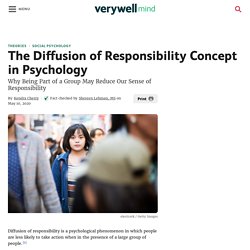
You notice a man fall to the ground and start convulsing as if having a seizure. Many people turn and look at the man, but no one moves to help or call for medical assistance. Why? Because there are so many people present, no one person feels pressured to respond. 6a833ac5e7ad92de902a8c99f8ffb514eb60. Pluralistic Ignorance (SOCIAL PSYCHOLOGY) - iResearchNet. Pluralistic Ignorance Definition Pluralistic ignorance occurs when people erroneously infer that they feel differently from their peers, even though they are behaving similarly.
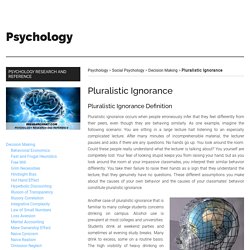
As one example, imagine the following scenario: You are sitting in a large lecture hall listening to an especially complicated lecture. After many minutes of incomprehensible material, the lecturer pauses and asks if there are any questions. No hands go up. You look around the room. Pluralistic ignorance. The embarrassed bystander: Embarrassability and the inhibition of helping. How to Overcome the Bystander Effect. Psychologists have long been interested in exactly why and when we help other people.
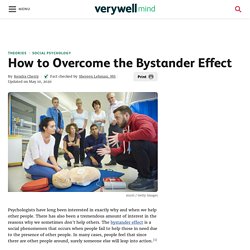
There has also been a tremendous amount of interest in the reasons why we sometimes don't help others. The bystander effect is a social phenomenon that occurs when people fail to help those in need due to the presence of other people. In many cases, people feel that since there are other people around, surely someone else will leap into action.1 While the bystander effect can have a negative impact on prosocial behavior, altruism and heroism, researchers have identified a number of different factors that can help people overcome this tendency and increase the likelihood that they will engage in helping behaviors.2 Some of these include: Witnessing Helping Behavior Sometimes just seeing other people doing something kind or helpful makes us more willing to help others. Imagine that you are walking into a large department store. Being Observant Being Skilled and Knowledgeable Guilt Feeling Good. How to Break the Bystander Effect.
They could have left it to someone else. An Army veteran blocked a shooter in Oregon from entering his classroom. Three friends on a high-speed train from Paris to Amsterdam helped stop a gunman wielding an AK-47. This past spring, an Army captain in North Carolina pulled a couple to safety after a fiery car crash. Were these men instinctively courageous, or had they learned to be? The Army captain (aptly wearing a Captain America T-shirt) credited his military training for knowing what to do and remaining calm. These heroes are dramatic examples. And this conundrum is not limited to thwarting terrorism or physically saving someone. But we often look the other way, like the priest and Levite in the Good Samaritan parable. Bystander effect. Bystander effect, the inhibiting influence of the presence of others on a person’s willingness to help someone in need.

Research has shown that, even in an emergency, a bystander is less likely to extend help when he or she is in the real or imagined presence of others than when he or she is alone. Moreover, the number of others is important, such that more bystanders leads to less assistance, although the impact of each additional bystander has a diminishing impact on helping. 5 Effective Tips to Overcome the Bystander Effect. Do you know about the bystander effect?
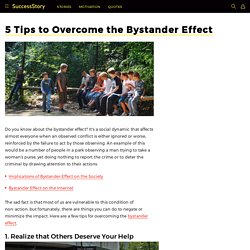
It's a social dynamic that affects almost everyone when an observed conflict is either ignored or worse, reinforced by the failure to act by those observing. Decision Model of Helping - IResearchNet. Decision Model of Helping Definition The decision model of helping, introduced in The Unresponsive Bystander by Bibb Latane and John Darley, outlines a process of five steps that will determine whether a bystander will act or not in a helping situation.
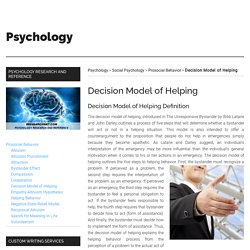
This model is also intended to offer a counterargument to the proposition that people do not help in emergencies simply because they become apathetic. As Latane and Darley suggest, an individual’s interpretation of the emergency may be more influential than the individual’s general motivation when it comes to his or her actions in an emergency. The decision model of helping outlines the five steps to helping behavior. First, the bystander must recognize a problem. Subject Competence and Minimization of the Bystander Effect - Cramer - 1988 - Journal of Applied Social Psychology. More bystanders responding to CPR incidents thanks to 3 public health interventions: Study, Singapore News.
SINGAPORE - A study has found that three measures, when applied together, have more than doubled the likelihood of bystanders performing cardiopulmonary resuscitation (CPR) on cardiac arrest victims in Singapore. Dispatch-assisted CPR, CPR and automated external defibrillator training, and the Singapore Civil Defence Force's myResponder app were found to have increased the responses of bystanders giving life-saving assistance to heart attack victims before paramedics attended to them. Dispatch-assisted CPR refers to CPR that is administered under the guidance of a first responder, such as a paramedic who may, through a phone call, assess the situation and give instructions to a bystander, who then performs CPR.
The study was conducted by researchers at the Duke-NUS Medical School, Duke University, and several organisations here, and published in August. The likelihood of a victim's survival also increased more than threefold, compared with no intervention, when all three aids were adopted. Bystander effect: Training in skills makes people more willing to help, Letters in Print News. Infographic on Social VR Bystander Intervention: Five Useful Tactics. Bystander Intervention Resources. StewartWilliams 2007. How to be kinder to strangers in Singapore, Opinion News. The Charities Aid Foundation recently released the World Giving Index 2017, which provides insight into the scope and nature of giving around the world. Based on data collected from the Gallup World Poll, the index, which polled 1,000 individuals in each representative country, revealed two surprising facts.
Myanmar, Indonesia and Kenya turned out to be among the most charitable countries, even though they have a huge number of their populations living below the poverty line. Being poor does not stop one from being generous. Wealthy countries such as the United States, Canada, New Zealand, Australia and the United Arab Emirates also feature in the top 10. Myanmar, the top country for four years in a row, has a poor human rights record, in part because of its treatment of the Rohingya Muslims. Singapore, ranked 30, is behind Indonesia (2), Myanmar (1) and Thailand (15), but streets ahead of Cambodia (134), Vietnam (116) and the Philippines (54) in Asean.
Changing our mindset. Overcoming the Bystander Effect. 69b04 vanbommeletaljespinpress. A Community Approach to Prevention. Teaching bystanders to intervene.